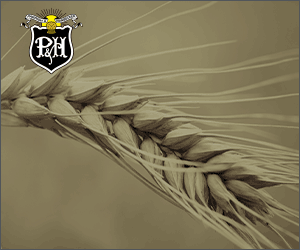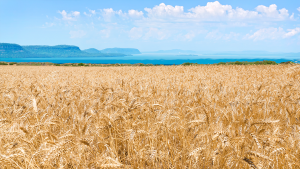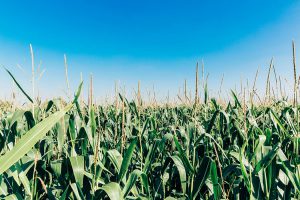In the know
NEW MENTAL HEALTH WORKSHOP

A CANADIAN-MADE farmer-based stress management training program that dozens of western Canadian farmers have taken is now rolling out in Ontario.
“We delivered 27 In the Know workshops here in Manitoba from January to March 2021,” reports Thea Green, program manager at Keystone Agricultural Producers which provides In the Know in that province. “We’ve had over 200 people take this training.”
Bob Bartley, a grain farmer in Roland, Manitoba, was one of them. He had heard about In the Know through an email from a friend, and then saw it promoted online in various spots. Having experienced quite a bit of stress over his lifetime, the program interested him. The first major mental health challenge for Bartley was in May 1992 when his mother unexpectedly died by suicide.
“Farming wasn’t that important that spring,” he explains. “There were so many other things to think about. It was hard to concentrate, which was actually dangerous.”
About 10 years later, this time it was a friend that Bartley lost to suicide. At that point, he joined a group of people who had lost loved ones in this way and wanted to raise awareness of mental health. Some time later, one of the foremost organizers in the group also died from suicide, as did, eight years ago, another friend of Bartley’s — this time a farmer.
NEEDED ACTION
Indeed, as a profession, farming has the highest rates of suicide and mental health complications compared to all others. About eight years ago, Dr. Andria Jones-Bitton at the University of Guelph started looking into farming and mental health. In 2015, she conducted a national survey of over 1,100 farmers to identify the mental health complications they face, which were later identified to include high stress, anxiety, burnout and low resilience. Jones-Bitton (and her then PhD student, now Dr. Briana Hagen) then conducted dozens of individual hour-long interviews to find the factors that contribute to these mental health outcomes. Funding for the research was provided by Ontario Ministry of Agriculture, Food and Rural Affairs, Ontario Pork, Egg Farmers of Ontario, Ontario Federation of Agriculture, Ontario Sheep Farmers, and the Canadian Animal Health Coalition. Prior to this research, there was little study of the mental health of farmers in Canada.
By 2018, Jones-Bitton and Hagen had developed a program to address mental health in the farming community, called In the Know. It was created in collaboration with stakeholder groups, including various agricultural sectors, mental health literacy trainers, government, and representatives from social work, psychology, epidemiology, and education.
In the Know is formatted as a four-hour workshop, delivered all at once with a short break in the middle and time allocated for questions. It aims to build mental health knowledge and increase help-seeking among farmers and others within farming — including farm family members, veterinarians, breeders, input salespeople, staff at financial institutions, accountants, and other community members who have direct contact with farmers.
Participants are trained to identify, understand, and handle mental health challenges. They also receive information about stress, depression, anxiety, substance misuse, and how to start a conversation around mental well-being.
Bartley believes that parts of the workshop will likely apply to a given person more than others do. “And I think any resource related to mental health is going to be more or less valuable, depending on your age, what you’ve been through, and so on,” he says. “I think the most important aspect of the workshop is to remember that you should not hesitate to reach out to someone who is acting differently or reach out to get help yourself. Don’t wait a day. And once you do bring it up with someone you’re concerned about, you need to stick with it and really connect during that conversation about this person’s stress. It’s much harder to reintroduce the topic the next day or the week or month after, so stick with it.”
TRAINING
In the Know was designed to be intensive and fit into half a day in a farmer’s busy life. Eventually, there will be an online version that can be absorbed when it is convenient, and a more intensive eight-hour version. Jones-Bitton and Hagen are also working to develop train-the-trainer classes about mental health in agriculture.
Hagen says that of all the aspects of content and delivery that were important to get right, it was most important that In the Know facilitators were (and are) trained by a trainer with an agricultural background. And when asked how it feels to see the program now really gaining steam in rolling out across the country, Hagen says “I’m overjoyed that people are taking the program and talking about this. I’m also relieved. We need mental health literacy training in agriculture.”
The program launched in Manitoba, Alberta, and British Columbia earlier this year, and is now being rolled out in Nova Scotia and Ontario. In Ontario, In the Know is being delivered by the Canadian Mental Health Association. In June, the organization’s Ontario branch relations lead, Mike Feenstra, and newly-trained facilitators ran a few sessions with Ontario Federation of Agriculture staff and board members to familiarize them with the workshop.
“From there, we’ll continue to promote it,” says Feenstra, “and we expect that most of our branches will be in a position to offer regularly-scheduled programs in the fall.”
For more information: In the Know in Ontario https://ontario.cmha.ca/intheknow/.
Grain Farmers of Ontario is committed to farmer wellness. •


























